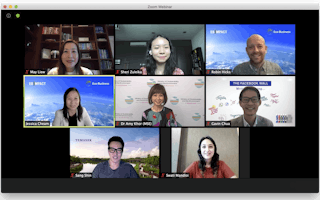As youths become increasingly aware about sustainability issues, they want greater transparency and engagement with various organisations—including universities, corporations and government—said speakers at the virtual launch of a mentorship programme called Sustainability Exchange on Friday (20 October).
To continue reading, subscribe to Eco‑Business.
There's something for everyone. We offer a range of subscription plans.
- Access our stories and receive our Insights Weekly newsletter with the free EB Member plan.
- Unlock unlimited access to our content and archive with EB Circle.
- Publish your content with EB Premium.
Organised by media outlet Eco-Business’ non-profit arm EB Impact, and in partnership with social media company Facebook, the mentorship programme will be a platform for youths to work on real-world projects under the guidance of sustainability professionals.
“Universities should understand that youths are not just angry activists that give ultimatums, but we want to be in partnership with them, to engage and support the process. We understand that these issues are complicated, but we want to be involved in it,” said Sheri Zuleika, a student at Singapore Management University.
Speaking about her experience of being involved in student divestment campaigns, Zuleika said that they have come up against claims that there isn’t a strong business case for a fossil fuel-free investment portfolio, although universities are reluctant to provide further explanations or disclose their portfolios.
“
It will be difficult for me to tolerate greenwashing in my future employers. Organisations need to understand that youths are becoming more knowledgeable about publicity stunts.
Sheri Zuleika, student, Singapore Management University
But BlackRock, the largest asset management company, has demonstrated otherwise by voting against companies that failed to make progress on tackling the climate crisis, said Zuleika.
In recent years, student divestment groups have been emerging from Singapore’s top universities, but have made little progress in pressurising their universities to pull investments in fossil fuels companies.
“We want to feel that we are being heard through greater engagement and transparency. That’s the first step in feeling that our actions are creating the impact we want,” said Swati Mandloi, a youth delegate for youth climate group Singapore Youth for Climate Action (SYCA).
Mandloi explained that the best engagements SYCA had were earlier this year, when Singapore revised its nationally determined contributions (NDCs) for the Paris climate agreement and conducted public consultations to include different voices.
But with stronger net zero commitments from countries like South Korea, China and Japan, Singapore now has the opportunity to ramp up its contributions. “Now the challenge for us is to communicate to both governments and corporations in Singapore to take a chance on decarbonising,” she said.
Responding to a question about what youths are looking for in their future employers, Mandloi said she looks for organisations that embrace diversity, are cognisant of their impact, and are setting targets to decarbonise their operations and value chain.
“It will be difficult for me to tolerate greenwashing in my future employers. Organisations need to understand that youths are becoming more knowledgeable about publicity stunts. If they want to advocate for sustainability, they need to walk the talk,” said Zuleika.
Balancing eco-anxiety and motivation
When asked about eco-anxiety — a chronic fear of environmental doom — Amy Khor, senior minister of state for sustainability and the environment in Singapore, said that in the heartlands, the residential parts of Singapore on the outskirts of the city, she didn’t think youths were concerned with eco-anxiety.
“In the heartlands, people talk about bread and butter issues,” Khor said. But eco-anxiety shows that there is a high level of awareness about climate change and its impact, which is a good thing, she said.
Around the world, feelings of grief and worry about the state of the environment are on the rise, especially among young people.
“I experience eco-anxiety, and most of my friends do too. The mindset is the overarching problem because we feel that as individuals, we might not have the power to take action,” said Zuleika.
“But we have to understand that we don’t need to be activists or experts in sustainability to be involved in sustainability efforts. We can contribute to real issues with our own different skills,” she added.
Agreeing, Mandloi said that eco-anxiety is a topic that comes up repeatedly during SYCA’s discussions.
She explained that after the first climate rally in Singapore, which called on the government to set bolder targets to reduce the city-state’s carbon emissions, the conversations around climate change have shifted from individual action to questions about public advocacy and how to support the government and corporates in implementing more sustainable projects.
“Coupled with anxiety, there’s a wave of motivation. Eco-anxiety is real, but it has helped bring many people together because we all want to find a solution to it,” said Mandloi.










